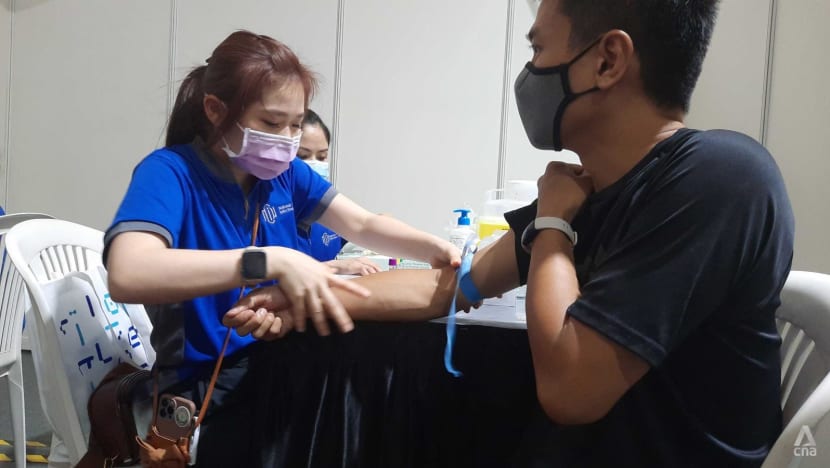FAQ: What is tuberculosis and can it be caught easily?
More cases of active tuberculosis (TB) emerged in Bukit Merah earlier this month. How does tuberculosis spread and can it be cured?

A healthcare worker draws blood from an individual during a tuberculosis screening exercise in Bukit Merah which began on Jan 11, 2024. (Photo: CNA/Koh Wan Ting)

This audio is generated by an AI tool.
SINGAPORE: Health Minister Ong Ye Kung on Sunday (Jan 14) urged people not to avoid ABC Brickworks Market and Food Centre in Bukit Merah, after reports of active tuberculosis cases in the area emerged earlier this month.
About 3,000 people who live and work in Bukit Merah were screened for tuberculosis, after 10 more active cases were detected. The cases were linked to a cluster first uncovered in 2022.
Hawkers at ABC Brickworks Market and Food Centre told CNA last week that business has dropped by up to 50 per cent, as regular patrons avoided the area.
How does tuberculosis spread? Can it be cured?
What is tuberculosis?
Tuberculosis is an airborne disease caused by a bacterium. It usually affects the lungs but can also affect other parts of the body, such as the brain, lymph nodes, kidneys, bones and joints.
Not everyone who is exposed to tuberculosis develops the illness, according to the HealthHub website.
Most times, the body can fight the germs, render them inactive and stop them from growing - but the germs remain alive in the body. This is latent tuberculosis infection.
Most people who are infected develop latent tuberculosis, said the Ministry of Health (MOH). People with latent tuberculosis do not have symptoms and do not spread tuberculosis to other people.
In about 90 per cent of people who have latent tuberculosis, the bacteria remains inactive in their body throughout their lives.
About 5 per cent of people with latent tuberculosis develop active tuberculosis within the first two years, said MOH.
The remaining 5 per cent may develop active tuberculosis sometime after two years and within their lifetime.
Health Matters: How contagious is TB?
Who might develop active tuberculosis?
Tuberculosis is transmitted through respiratory droplets from an infected person.
It is spread through "close and prolonged exposure", usually days to weeks, said Mr Ong. A person may get tuberculosis if they live or work daily with a person who is infected.
"They cannot get (tuberculosis) by sharing cups, utensils or food, through hand shaking, or having the occasional meal at the hawker centre," said Mr Ong in a Facebook post on Sunday.
According to MOH, the risk of progression from latent tuberculosis to active tuberculosis is higher in people who have underlying medical conditions such as HIV infection and diabetes.
Those who have a weakened immune system - due to drugs or sickness - or have poor nutritional status may also develop active tuberculosis. Substance abusers and drug addicts are also at risk.
The World Health Organization (WHO) states that babies and children are at higher risk and may develop symptoms.
How do I know I have tuberculosis?
Unlike infection, a person who develops tuberculosis disease will have symptoms. These may be mild for many months, said the WHO.
Some common symptoms of tuberculosis disease are chest pain or a prolonged cough, sometimes with blood. The person may also feel weak or fatigued, and get fever and night sweats. They may also lose weight.
The WHO urges those at increased risk to get tested.
"Early detection is key. If you have a persistent cough that lasts three weeks or longer, you should consult a doctor immediately," said MOH.
The doctor may ask the person to go for a chest x-ray or they may be referred to a specialist for further clinical and lab investigations.
Mr Ong said that the screening exercise in Bukit Merah was a precautionary measure to identify cases among those who live and work in the area.
People who frequently visit – or have spent more than 12 hours per month between November 2021 and January 2024 – the market can also voluntarily go for screening.
This is to ensure that those who are infected can be treated to further reduce the risk of transmission.
"The vast majority of us don’t fall into this category so please go ahead and enjoy the good food at ABC. Let’s support our hawkers," said Mr Ong.
What are the treatments for tuberculosis?
Once a deadly disease, tuberculosis can now be cured with anti-tuberculosis drugs or antibiotics.
Treatment of active tuberculosis usually involves a combination of several drugs, taken for six to nine months.
"More than 95 per cent of people with active tuberculosis are cured if they take all the medication as prescribed and until completion. Otherwise, tuberculosis may recur or become resistant to first-line anti-tuberculosis drugs," said MOH.
It is also dangerous to stop medication early or without medical advice, as this can allow the tuberculosis that is still alive to become resistant to drugs, said WHO.
Drug-resistant tuberculosis is "extremely difficult" to treat as less effective drugs will have to be used, added MOH.
In such cases, second-line tuberculosis drugs must be taken for a longer period in order the clear the infection, and the chance of getting cured is considerably reduced.
Is there a vaccine for tuberculosis?
The Bacillus Calmette-Guerin (BCG) vaccine is used to help prevent tuberculosis.
According to the HealthHub, the vaccine is "highly effective" in preventing serious forms of childhood tuberculosis, such as tuberculosis meningitis – inflammation of the covering around the brain or spinal cord.
The BCG vaccine is part of Singapore's National Childhood Immunisation Schedule and is routinely given to newborns soon after birth.
The vaccine may also be considered for adults who have not been previously infected with tuberculosis or are unvaccinated, as they may be at a higher risk of contracting tuberculosis.
These include those with a risk of exposure from work, such as people working in healthcare or long-term care facilities. Prison workers or those exposed to cattle or monkeys are also at risk, said HealthHub.
A test to check if the person is infected with tuberculosis is recommended before vaccination.


















